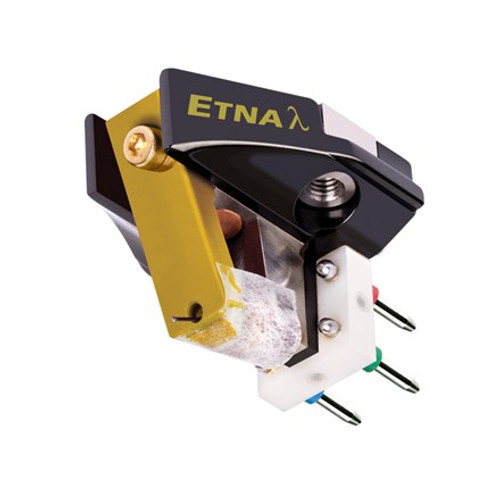Hand-Built Lyra Etna SL Lamba MC Phono Cartridge Features Single-Layer Winding: Experience Lifelike Sound, Reference Tracking, Revelatory Presence, and On-Point Accuracy
Among the most superb- and lifelike-sounding MC phono cartridges made, the Stereophile Class A Recommended Lyra Etna SL Lambda features a single-layer winding for reduced moving mass and uses unique engineering to remove resonance. Yes, Etna SL Lambda is a big step up in price from most cartridges, but one that yields gains in transparency, the removal of distortion, and remarkable accuracy. In short, the advanced design principles allow the focus to be placed on the music buried in the grooves of your records. Hand-made in Japan and individually tuned for optimal uniformity, Etna SL Lambda is a prestigious musical instrument. And a cartridge deserving of the "ultimate" moniker.
Delivering revelatory detail, top-to-bottom dynamics, and precision tracking, Etna SL Lamba is made possible by Lyra chief designer Jonathan Carr's quest to reduce the vibrational energy that's always bedeviled cartridge manufacturers. After years of painstaking research and analysis, Carr and his team determined that screws and voids in earlier designs caused internal reflections and sympathetic resonances held back their cartridges' full potential.
To solve this stubborn vibration conundrum, Carr and company separated the tapered dampers of Lyra's widely praised New Angle design into flat elastomers. The innovation dramatically improves Etna SL Lambda's ability to halt vibrations from smearing transients and reducing clarity. An innovative support "pillow" also serves as Etna SL Lambda's cantilever preloading element. You can read plenty more about the construction methods below – each aspect optimized to maximize efficiency, neutrality, resolution, and quiet – and rest assured the long-footprint variable-radius line-contact nude diamond stylus operates in ideal harmony with the diamond-coated solid born rod cantilever system.
We could go on about the emotional sound you'll experience, but we'd prefer you let Etna SL Lambda's blazing speed, superior separation, and on-point accuracy help transform your vinyl LPs into musical events sooner than later.
"This cartridge marries listening ease with kaleidoscopic colors and haunting spatiality. Musical engagement is a foregone conclusion."
– Alan Taffel, The Absolute Sound, Golden Ear and 2025 Editors' Choice Awards
"The Etna rode silently in the groove, effectively rejecting any defects that normally produce impulse or constant noise. One of the most neutral yet enticing-sounding cartridges I've ever heard, it's also one I can recommend for any system and for any musical taste!"
– Michael Fremer, Stereophile, Class A Recommended Component
Differences Between Lyra Etna Lambda and Etna SL Lambda
Available only by special order, Etna SL Lambda is a super-low output (0.2mV) version of Etna Lambda featuring a single-layer winding that reduces by half the moving mass, netting increased detail and enhanced resolution. Due to the reduced output, Etna SL Lambda requires a high-gain phono preamplifier capable of 64dB of gain or a step-up transformer designed for cartridges of 2-3 ohms or less. While Etna SL Lambda is definitely not for all users, those with the proper components will experience the added benefits of extra purity, more pristine tones, and deeper details.
Asymmetric Design, X-Shaped Coil Formers for Elite Tracking and Separation
Akin to Atlas SL Lambda, Etna SL Lambda utilizes the asymmetric design concept but moves the screw/screwhole all the way to the front of the cartridge and interposes a bronze damping barrier between it and the mechanical path linking the cantilever assembly to the tonearm head shell. Freed of all obstructions and voids, the rigid, direct path established between cantilever and head shell is highly effective at draining away vibrations once they have been converted into electrical signals – effectively suppressing induced resonances and internal reflections that would otherwise manifest as sonic colorations. A narrowed mounting area couples Etna SL Lambda more tightly to the head shell and facilitates the transfer of vibrational energy into the tonearm, giving even better control over spurious resonances. Etna SL Lambda also retains the X-shaped coil formers from Atlas SL Lambda. Compared to traditional square coil formers, the X-shape allows each channel to operate with greater autonomy, increasing tracking consistency and channel matching while also improving channel separation due to the decrease in crosstalk. Lyra's New Angle technology pre-biases the signal coils so they are perfectly aligned to the front and rear magnets during LP playback, which allows the coils to move optimally in all directions for distortion-free performance.
Cantilever Directly Mounted Into Cartridge Body Reduces Information Loss
Etna SL Lambda uses a yoke-less dual magnet system, diamond-coated boron rod cantilever, and Lyra-designed variable-radius line-contact stylus. Lyra remains the only cartridge manufacturer to mount the cantilever directly into the cartridge body to create a rigid, seamless connection between the cantilever assembly and tonearm head shell. Why? Linear transducers such as phono cartridges are inherently inefficient devices (on the order of 5-10%). In other words, of the vibrational energy that enters a cartridge from the LP groove, only 5-10% will be converted into electrical signal. The cartridge's internal damping system will dissipate some of the remaining 90 to 95%, but much of the excess vibrational energy will reflect inside the cartridge, creating internal echoes and a general diminishing of fidelity. It is quite easy to hear this with many cartridges. Olay a highly modulated LP with the power amp turned off, and bring your ear close to the cartridge. The "needle talk" that you hear is excess vibrational energy which isn't being controlled properly. Etna SL Lambda's direct-mounted cantilever helps conduct this excess vibrational energy into the head shell, where it is safely dissipated within the greater mass of the tonearm and turntable plinth.
Constrained-Layer Construction Yields Sonic Freedom
Etna SL Lambda features a center structure made of solid titanium, but unlike Atlas SL Lambda, its central core is surrounded by an outer body machined from highly polished aircraft-grade aluminum and anodized with a brilliant black finish. The two pieces are press-fitted with resonance control rods and stainless steel screw bushings in a multi-material approach that touts significantly improved rigidity and damping characteristics. The prime advantage of such constrained-layer construction: No single material's sonic signature defines the sound of the cartridge.
Builder: Yoshinori Mishima
Type: Medium weight, medium compliance, low-impedance moving coil cartridge
Stylus: Lyra-designed long-footprint variable-radius line-contact nude diamond (3μm× 70μm), slot-mounted
Cantilever system: Diamond-coated solid boron rod with short one-point wire suspension, directly mounted into cartridge body via high-pressure knife-edge system
Coils: single layer, 6 N high-purity copper, chemically-purified high purity iron cross-shaped former, 1.52 ohm self impedance, 1.9μH inductance
Output voltage: 0.25mV@5 cm/sec., zero to peak, 45 degrees (CBS test record, other test records may alter results)
Frequency range: 10 Hz〜50 kHz
Channel separation: 35 dB or better at 1 kHz
Compliance: Approx. 12× 10 cm/dyne at 100 Hz
Vertical tracking angle: 20 degrees
Cartridge body: Multi-material (titanium, duralumin, bronze, stainless steel) self-clamping construction with reduced-surface higher-pressure headshell contact area, predominately non-parallel shaping, phase-interference resonance-controlling mechanisms, and body threaded directly for mounting screws
Cartridge mounting screws: 2.6 mm 0.45 pitch JIS standard
Cartridge weight (without stylus cover): 9.2g
Distance from mounting holes to stylus tip: 9.52mm
Recommended tracking force: 1.68〜1.78g (1.72 g recommended)
Recommended load directly into MC phono input: Determine by listening.
Recommended load via step-up transformer: 1〜10ohm (connect step-up transformer’s output to 10kohm〜47kohm MM-level RIAA input, preferably via short, low-capacitance cable)
Recommended tonearm: High-quality pivoted or linear (tangential) tonearm with rigid bearing(s), adjustable anti-skating force, preferably VTA adjustment






































